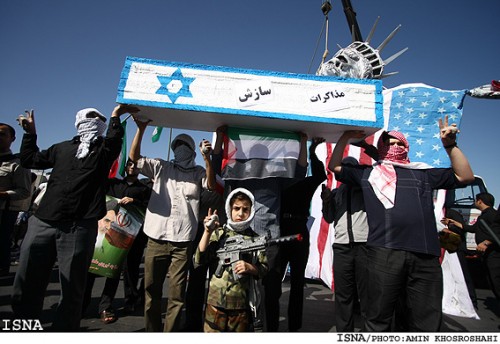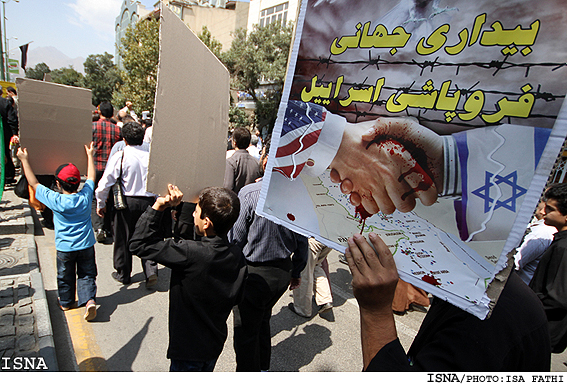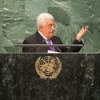![]()
Sun, Sept 12, 2010 | The Meir Amit Intelligence and Terrorism Information Center
Iran Strongly Criticizes Resumption of Israeli-Palestinian Negotiations
Strong criticism has been voiced in Iran this week over the resumption of the political dialogue between the Palestinian Authority and Israel.
President Ahmadinejad himself personally lashed out against PA chairman Mahmoud Abbas (Abu Mazen), claiming he had no mandate whatsoever to hold negotiations on behalf of the Palestinian people. In a speech given on the occasion of Qods Day, marked in Iran last Friday (sept 03, 2010), the president said that Abu Mazen was not authorized to represent the Palestinian people or sell parts of Palestinian land to the “Zionist enemy”. According to the president, the Palestinians have nothing to talk about with Israel while it continues to occupy their land, murder them, and destroy their homes. He further added that the US couldn’t be counted on to be a fair mediator in the negotiations since it was “in league with the thief”, and that its intention was to serve the interests of the Zionists, make them stronger, and give them a pretext to continue oppressing the Palestinian people (various news agencies, September 3).
Majles speaker Ali Larijani has also spoken out against the resumption of the Israeli-Palestinian negotiations this week. In a speech given during the Qods Day events in the city of Qom, Larijani said that the whole purpose of the negotiations was to allow the West to step up the pressure exerted on the Palestinians (ISNA, September 4).
In recent days, Iranian media has been focused on criticizing the resumption of the negotiations. The conservative daily Keyhan claimed that, in fact, the negotiations were aimed to let Israel and the US find a new way to contend with Iran. The resumption of the negotiations reflects a joint Israeli-American decision to deal with the Palestinian issue and the Iranian issue at the same time, while the Israelis and the Americans disagree on which issue deserves a higher priority. The Israelis were forced to agree to resume negotiations upon realizing that they could not launch a military attack to deal with Iran’s nuclear program. Netanyahu has no desire to be accused by President Obama of derailing the peace process, which may prompt the US to terminate its activities against Iran. Abu Mazen, too, has no other alternative but to engage in negotiations with Israel, while Obama wants to prove that he is a successful president before the US elections this coming November to cover up the failure of his foreign policy in the past two years. (Keyhan, September 5).
Having failed to pull Syria out of the “axis of resistance”, the US is now interested in working with the Palestinians in yet another attempt to weaken that axis. The US fails to realize that the resistance will not stop, since the only possible solution to the conflict is for the Zionists to return to the countries from which they had come. The problem of Palestine will be solved when there is nothing left of the thing called “Israel”, making any negotiations with it meaningless (Keyhan, September 5).
The daily Jomhuri-ye Eslami also claimed that resistance is the only way to deal with Israel. Forty years of negotiations with it yielded no positive results for the Palestinian people; in fact, the Zionist oppression of the Palestinians only intensified. The sole reason Israel has been unable to achieve its goals, despite the cooperation it received from “reactionary” Arab leaders, is the fact that ordinary Muslims worldwide support the Palestinian cause. The peace negotiations are a scheme designed to let the Zionist regime grow stronger and realize its goals. The resumption of the negotiations is a new effort to deal with the significant consequences of the massive participation in the Qods Day events across the Muslim world, reflecting the concerns of the Zionists and their allies over the Muslim peoples’ support of the Palestinians. The Palestinian people have long since condemned the negotiations, and the massive participation in the Qods Day events across the Muslim world is living testimony for the stance which rejects the negotiations (Jomhuri-ye Eslami, September 4).
The official daily Iran claimed that Israel does not consider the negotiations to be a way to end the conflict, but rather a means to solve the problem of “defensive survivability” it is currently facing. President Obama compelled Netanyahu to come back to the negotiating table with a promise that the US would not oppose Israel’s policy in the PA-administered territories, particularly in Jerusalem. According to the daily, the Qods Day protests prove that the Palestinian problem cannot be solved with the help of Washington, London, Paris, Cairo, or Amman, but only with Islamic determination (Iran, September 4).
Sobh-e Sadeq, the Revolutionary Guards mouthpiece, also joined in the criticism of the negotiations’ resumption, accusing Palestinian Authority leaders and moderate Arab countries of supporting a compromise with the “Zionist regime” for their own personal and “family” interests. Every reasonable, freedom-loving person understands that it is the Palestinians’ right to fight the occupiers to liberate their land, said a commentary article published in the weekly newspaper. Some supporters of the “compromise front” claim that Palestinian rights would be better served by negotiations with Israel. The truth is, however, that since the beginning of the peace process in the ‘70s until now, no Palestinian rights have been secured by means of negotiations, the Zionists’ crimes have only intensified, and the building of settlements in the occupied territories as well as the annexation of Jerusalem have continued. It is clear, therefore, that continuing the negotiations is hopeless, and that the real reason why some elements in Arab countries and in the PA support the peace process is their desire to guarantee their own interests while reaching a compromise with Israel and betraying Islam and the Palestinian people. (Sobh-e Sadeq, September 6).
For example, Egypt’s President Hosni Mubarak supports a compromise with Israel to guarantee Western support for the continuing oppression of domestic opposition to his government, thus preserving his own power and the power of his son, Gamal, after his eventual death. The weekly concluded by saying that the negotiations in Washington were only meant to give the Zionists an opportunity to complete the occupation of Palestine and expel the Palestinians from their land. The proximity of the Israeli-Palestinian negotiations to Qods Day stresses the need for continuing resistance against world Zionism, which will eventually result in the liberation of the Al-Aqsa Mosque, a prelude to the prayer which the “Vanished Imam” will give in Jerusalem (Sobh-e Sadeq, September 6).



 RSS
RSS












Iran Strongly Criticizes Resumption of Israeli-Palestinian Negotiations | #iran #peace #israel #talks http://j.mp/aW5aKK
RT @CrethiPlethi: Iran Strongly Criticizes Resumption of Israeli-Palestinian Negotiations | #iran #peace #israel #talks http://j.mp/aW5aKK
RT @RantsbyRemnant: RT @CrethiPlethi: Iran Strongly Criticizes Resumption of Israeli-Palestinian Negotiations | #iran #peace #israel #talks http://j.mp/aW5aKK
RT @RantsbyRemnant: RT @CrethiPlethi: Iran Strongly Criticizes Resumption of Israeli-Palestinian Negotiations | #iran #peace #israel #talks http://j.mp/aW5aKK
RT @CrethiPlethi: Iran Strongly Criticizes Resumption of Israeli-Palestinian Negotiations | #iran #peace #israel #talks http://j.mp/aW5aKK